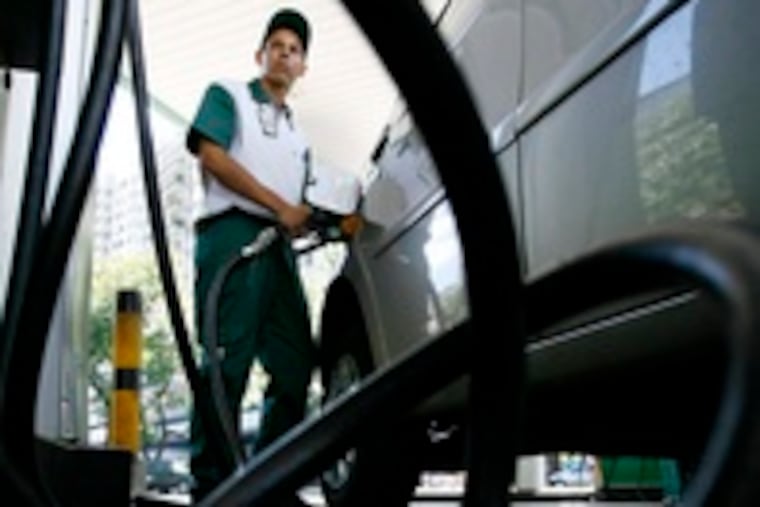Brazil's experiment in renewable fuel
Its sugarcane fields produce a bounty to turn into ethanol.

SAO PAULO, Brazil - Brazil is infamous for its deep divide between rich and poor, but most drivers are equal at the pumps. Day laborers jammed in minivans and professionals motoring solo in air-conditioned comfort can buy gasoline - or pay about 40 percent less per tank for ethanol.
It is such a no-brainer that almost everyone fills up with the alcohol-based fuel, produced from fields of sugarcane that carpet Latin America's largest nation. And as long as international oil prices stay above $50 a barrel, ethanol will likely stay on top in Brazil's revolutionary fuel-choice experiment.
Three years after U.S., German and Italian automakers introduced "flex-fuel" cars in Brazil that run on gas, pure ethanol or any combination of the two, foreign investors are pouring in billions of dollars to start up ethanol operations in a nation some call "the Saudi Arabia of renewable fuel."
Countries such as China, Italy and Japan plan to start mixing ethanol with gas and are securing supplies and know-how from the planet's most efficient producer and top exporter.
Brazil has boosted its ethanol production 40 percent over the last five years, from 3 billion gallons in 2002 to 4.2 billion gallons last year. During the same period, U.S. production rose 75 percent, from 2.8 billion gallons to 4.9 billion gallons, almost all of which went to the domestic U.S. market.
While Brazil is pledging to double production over the next decade, many experts agree U.S. farmers cannot meet the potential demand from President Bush's goal of consuming 35 billion gallons of alternative fuels every year by 2017, a fivefold increase over current requirements. That is a big reason Bush signed a deal with Brazil in March to promote production elsewhere in Latin America and the Caribbean.
The boom is so great that ethanol promoters even talk openly about how a post-Castro Cuba could become a key supplier for the United States, which produces ethanol from corn, a much less efficient raw material.
"Brazil has developed the model," said David Rothkopf, who recently prepared a 600-page report on ethanol and other biofuels for the Inter-American Development Bank. Brazilians "arrived at this by both innovation and accident, but they've really been leading and giving the world something to look at. Everybody is beating a path to Brazil to see what they're doing."
Brazil and Latin American nations have big advantages over the United States: warm climates conducive to massive sugarcane plantations, with distilleries on site to process cane into fuel 24 hours after harvest.
Nations such as Colombia, the Dominican Republic, El Salvador, Guatemala and Honduras are lining up for financing of sugarcane-energy operations.
In Mexico, corn's birthplace, farmers hope to transform an industry now geared mostly toward domestic tortilla consumption. About 21 million acres of cornfields are being expanded 4.3 million acres this year alone.
This ethanol buzz also has unleashed a backlash from left-leaning groups, socialist Venezuelan President Hugo Chavez and Cuban leader Fidel Castro. They fear the poor will lose land and even starve as food production shifts to energy.
In Brazil, ethanol production is run almost exclusively by large corporations and well-heeled families, and there are no signs that the business model will change to include impoverished farmworkers as stakeholders.
"Where are the poor countries of the Third World going to get the minimum resources to survive?" Castro asked in an article published in early April. "I'm not exaggerating or using unmeasured words. I am sticking to the facts."
Chavez also came out against the U.S.-Brazil ethanol accord, saying U.S. ethanol takes "corn away from people and the food chain to feed automobiles - a terrible thing."
In Brazil, there is no denying that ethanol is king, available to drivers across the nation and at every gas station in Sao Paulo, South America's largest city. Eight of every 10 new Brazilian cars are flex-fuel, and most drivers fill up with ethanol at a third to half the price of gas.
Another barrier to ethanol for U.S. drivers is the 54-cent-per-gallon tariff the U.S. levies on Brazilian ethanol imports - a tax President Luiz Inacio Lula da Silva is lobbying hard to have lifted.
Bush's brother Jeb, the former Florida governor, said he believed the U.S. tariff would be reduced or eliminated within several years despite stiff opposition from U.S. farmers. Now a codirector of the Interamerican Ethanol Commission lobbying for increased production across Latin America, Jeb Bush said the tariff "has to be phased out" to satisfy the need for ethanol imports.
But even if Congress slashes the tariff, U.S. demand cannot be met without ethanol imports from other Latin American nations that once produced most of the world's sugar.
Cuba, settled by Spaniards to feed colonial sugar demand, would be a logical choice given its proximity to Florida, and because the fuel-hungry state lies far away from America's ethanol-producing heartland.
"If there was a free Cuba, it could be a great exporter, and it is discussed," said Brian Dean, the commission's executive director.
The Latin Boom
Ethanol production: Brazil boosted ethanol production from 3 billion gallons in 2002 to 4.2 billion gallons last year.
In the same period, U.S. production rose from 2.8 billion gallons to 4.9 billion gallons.
A new deal: President Bush in March signed a deal with Brazil to promote ethanol production in Latin America and the Caribbean.
The U.S. disadvantage: U.S. farmers may be unable to deliver on Bush's goal to use 35 billion gallons of alternative fuels yearly by 2017.
The Latin American edge: Brazil and Latin American nations have ample land and warm climates for massive sugarcane plantations and on-site fuel distilleries. Colombia, the Dominican Republic, El Salvador, Guatemala and Honduras are lining up for financing.
SOURCE: Associated Press
EndText